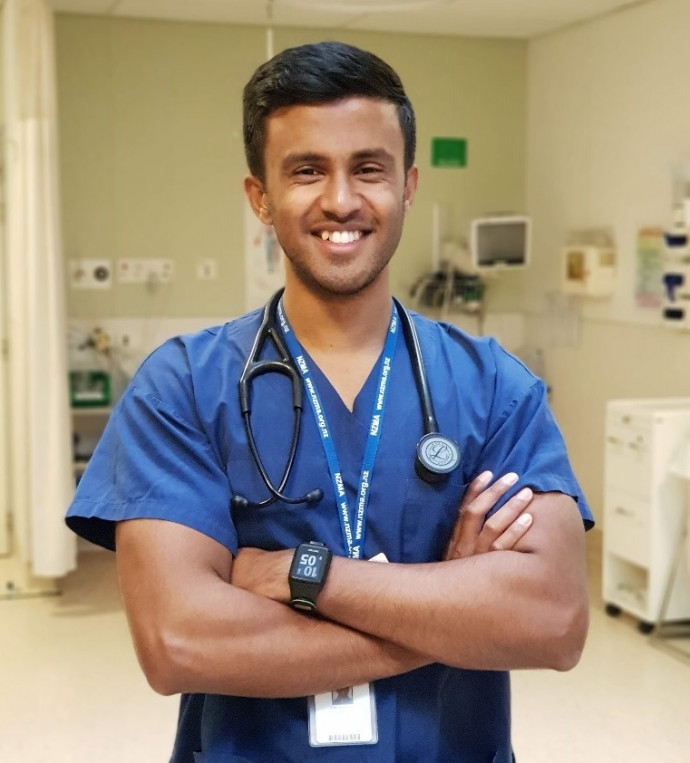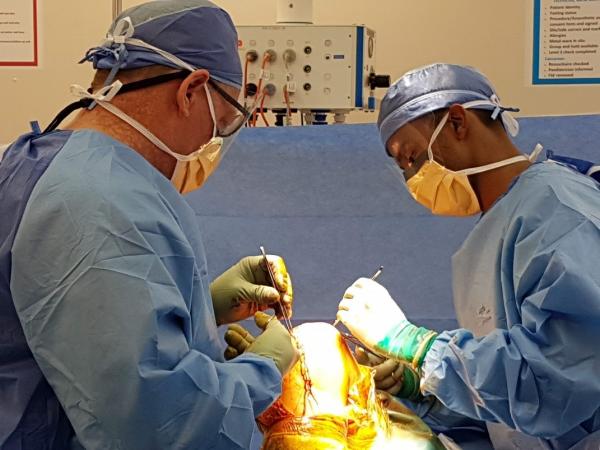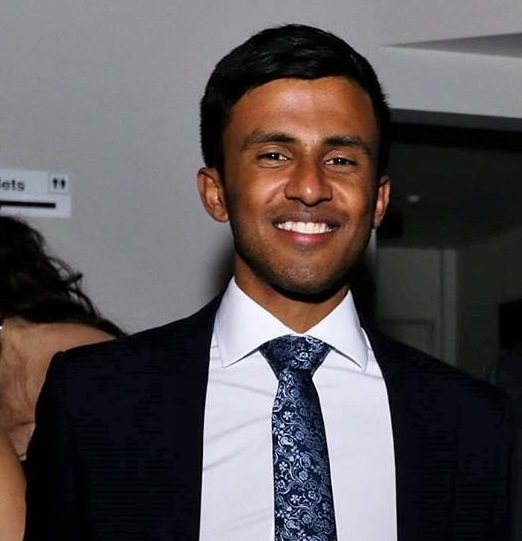Cheyaanthan Haran

Cheyaanthan starts by describing his day in the life of a junior doctor. A very eventful day! He shares his journey for those with an interest in studying medicine. Chey first came into contact with the Society in 2011 when he was a Year 13 student at Wellington College.
It’s 6.45am on a crisp winter's morning in the Wairarapa. I’m in the medical-surgical ward preparing for the day ahead. This involves reviewing the discharge summaries of those patients who were discharged from the Emergency Department with a bone or joint problem overnight, reviewing the progress of the inpatients, preparing the ward list and the ward round notes.
It’s now 7.20am and I’m presenting the cases at the x-ray meeting to the department. 7.30am and we commence our ward round with our sickest patient in the High Dependency Unit — 30 minutes later we’ve finished reviewing all our inpatients. I have 40 to 60 minutes to order radiology scans, make referrals to other specialties and discharge four patients. In the midst of my frantic efforts, I’m called by the theatre nurse manager. I have been summoned to assist the surgeon in an elective total knee joint replacement – the patient's knee is shot from years of wear and tear. At the end of the case, I scrub out and head over to the ward to continue chipping away at my ward work. I get a call shortly from a surgeon who has admitted a sick patient to the ward directly from the outpatient clinic – I give them a quick check over to see if they are fit for surgery and whether we can help them with any of their other medical problems.
Before I know it, I’m back in theatre assisting with an urgent fracture repair of a leg – they fell three metres off a building. Halfway through the case, my phone buzzes – the patient from this morning is bleeding. I scrub out, head over to the ward, review the patient, take the dressing down and have a look at the wound. It appears to be general ooze, but their vital signs are off. I send some blood tests to the lab, chart some fluids through a drip, order compression dressings and head back to theatre. On the way, I get called by the Emergency Department consultant. There’s a patient who’s turned up with a fractured hip. The patient is currently stable, so I assist in theatre as they’re a person down.
It’s 1.30pm. I’ll finish up with this case, grab a quick bite then go and see this patient in ED. Who knows what the second half of the day has in store for me. Every day is different!
How did I get to where I am?
It wasn’t until I was in year 13 at Wellington College that I decided I wanted a career in medicine – a 10-month old cousin died of biliary atresia, where the bile duct can be narrow, blocked or absent. Medical research in this area is progressing, but the exact cause is unknown. After reading into this, I developed an interest in scientific research.
Pursuing my new found curiosity, I investigated the variants of rice and the effect on blood sugar levels. My project quickly progressed to Realise the Dream (National Schools Science and Technology Awards,) through Royal Society Te Apārangi. Such opportunities amplified my fascination for medicine, and before I knew it, I was grinding through my first year of university aiming to score a spot in medical school.
Altogether, medical school in Aotearoa takes six years. The second and third year is theory intensive, focussing on core sciences such as anatomy, physiology, biochemistry, pharmacology and pathology. Practical experiences include cadaver dissections, laboratory-based modules and community visits to name a few. In fourth year you embark on three years of clinical placements rotating through different specialties, such as general practice, surgery, obstetrics & gynecology, paediatrics and internal medicine. I made the most of my opportunities and clocked up experiences in 11 unique clinical institutions: Kaitaia Hospital, Middlemore Hospital (South Auckland), Waikato Hospital, Rotorua Hospital, Avalon Medical Centre(Hamilton), Auckland City Hospital, Starship Children's Hospital (Auckland) and Moerewa Medical Services. I also did placements in cardiothoracic surgery, intensive care, anaesthetics and interventional cardiology at the world-renowned hospitals: Austin Hospital (Melbourne, Australia), Barts Heart Centre (St Bartholomew's Hospital, London, United Kingdom) and Great Ormond Street Hospital (London, United Kingdom).
I finally finished with a Bachelor of Medicine and Bachelor of Surgery at the University of Auckland. Now I’m based in Wellington and Wairarapa.
Is medicine an art or science?
Basic scientific principles and evidence-based research underpin the practice of medicine. However, being a doctor isn’t just about saving lives, as one might think! Medicine also involves improving the quality of life or easing the suffering for a patient. Communication, personal skills, professionalism, rapport, and education are some of the skills that a doctor must be proficient in. Take, for example, a nine-year-old girl who on multiple occasions presents to the hospital with attacks of asthma. Are they correctly using their inhaler or spacer that helps relax their lungs? Can they afford the medications to help control their asthma? Is their home warm enough? Is it the second-hand smoke that’s triggering these attacks? The list is endless, yet these are some of the issues a doctor must consider and address for medicine to work. As doctors, we are at the forefront of holistic care for each patient. This is what I specifically enjoy about my career in medicine; the idea of a multifaceted approach to “the” patient.
The good physician treats the disease; the great physician treats the patient who has the disease – Sir William Osler

Right total knee joint replacement surgery (Written consent obtained from the patient with permission to publish online)
What about the scientific research?
It wouldn’t be a Royal Society Te Apārangi piece without outlining a little bit about my research involvements! Professor John Windsor, a Fellow of the Royal Society Te Apārangi and a personal mentor, advocates for the “bench to bedside”, where a clinician asks scientific questions based on the patient in front of them, probe those questions in a laboratory and ultimately execute those solutions in real life medicine. I have personally adopted this vision, incorporating research into my daily practice.
I have been involved in a few research projects from a range of specialities. I owe it to my supervisors for guiding me through their research. Just to give you an idea of what you can get involved in as a medical student/junior doctor, I’ve outlined a few involvements below:
- Surgery:
- International observational study of postoperative ileus (hyperactive dysmotility of the gut after surgery) and management after colorectal surgery.
- Preoperative blood markers for the assessment of postoperative mortality and morbidity risk after cardiac surgery, with the Waikato Cardiothoracic department.
- Assessment of scoring systems to help junior doctors diagnose appendicitis with greater certainty, with the Middlemore Surgical department.
- Paediatrics:
- Compared the efficacy and safety of intermittent inhaled corticosteroids versus placebo in the management of children and adults in patients with persistent asthma, with the Cochrane Collaboration.
- Epidemiology and Public Health Medicine:
- Investigated the costs of visiting a family doctor and the implementation of the free after-hours healthcare scheme for children, with the Child Poverty Action Group, an independent charity working to eliminate child poverty through research, education and advocacy.
- Education and training:
- Microsurgical dexterity for medical students and doctors, with the Waikato Cardiothoracic Surgery department.
- Audits – an excellent way to assess if research-based policy/guidelines are put into practice!
Along the research front, I was the Editor-in-Chief of the New Zealand Medical Student Journal, the national peer-reviewed academic medical journal for students of Aotearoa - peer-reviewed by academics, clinicians and students. Anyone is welcome to submit given it has a healthcare twist. Find out more on how to submit an article (Sneaky plug!).

Where to from here?
I am a first-year junior doctor. Not only have I just finished six years of medical school, but I need to complete my junior doctor years as a house officer, undertake registrar training followed by a fellowship to refine my interests/skills. Here’s an approximate analogy of my anticipated medical training timescale: six years of primary school (medical school), two years of intermediate (house officer), five to eight years of high school (registrar) then two to three years of university (fellow). But, it doesn’t stop there. As a consultant, you owe it to the patients to provide them with the best possible healthcare service which requires ongoing up-skilling.
Medical training is highly variable depending on your interests, passion and ambition, so it can be shorter or longer. After medical school you get to pave your pathway whether you want to specialise in family medicine as a general practitioner where you care for multiple generations of family members, or as a neurointerventional radiologist where you can retrieve small clots from the blood vessels in the brain. The opportunities are endless! Though still very early in my career, I’m interested in an academic surgical career so I’d like to incorporate a PhD in amongst it.
My one piece of advice for those interested, find a mentor and understand what a career in medicine involves. Though challenging, from my limited experience thus far, medicine is a highly rewarding and humbling profession where you can help patients change the course of their lives.
Thank you to Royal Society Te Apārangi for inviting me to write this piece – I have many more insights to share. If interested, please get in touch with Debbie Woodhall who can connect us!
(Disclaimer: My day above is described from the point of view as an Orthopaedic Resident Medical Officer at Wairarapa Hospital, Masterton. Experiences between junior doctors are widely different between specialities and hospitals across the country.)
